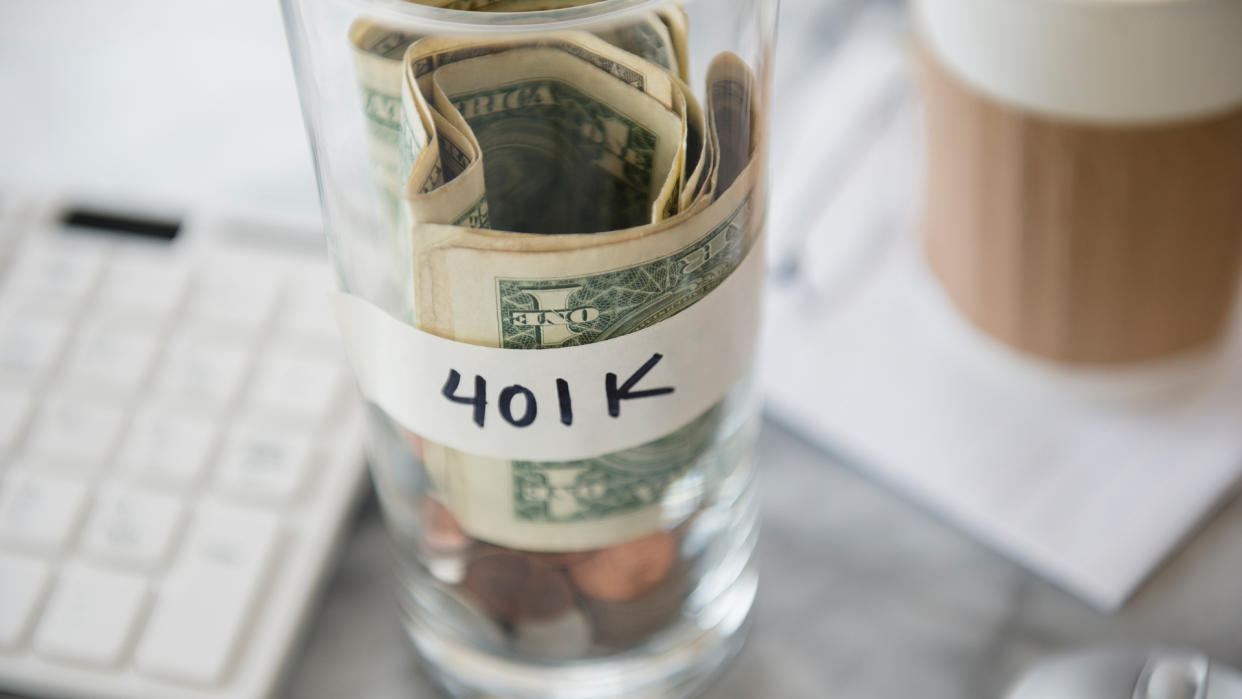Everything You Need To Know About Using Your 401(k) for a Down Payment on a House

You want to buy a new house, but in today’s competitive market, you don’t have enough cash for a healthy down payment. Since there’s plenty of money sitting in your 401(k) account, you’re thinking about taking a loan or a withdrawal from your retirement fund.
Support Small: Don’t Miss Out on Nominating Your Favorite Small Business To Be Featured on GOBankingRates — Ends May 31
Brian Walsh, CFP®, senior manager of financial planning at SoFi, said there are both pros and cons to taking this approach. For starters, he said borrowing money from your 401(k) allows you to bypass the underwriting and credit implications that come with traditional lenders.
“With a 401(k) loan, you do not need to apply or pass a certain credit threshold,” he said. “401(k) loans also do not show up on your credit report, so it may not impact your mortgage application like borrowing money from other sources.”
Additionally, Walsh said this route can be cheaper in the long term.
The Economy and Your Money: All You Need To Know
“Borrowing money from your 401(k) can charge a lower interest rate than many other types of debt,” he said. “So if you absolutely need to borrow money in a pinch, it can be more cost-effective over the long-term.”
Of course, there are also several disadvantages to tapping into your retirement account — if you’re even able to in the first place.
“Although 401(k) loans are very common not every employer offers this option, so you should check with your employer to see if this is even an option,” Walsh said.
If your employer does allow you to withdraw funds from your account, he said you won’t be granted unlimited access.
Read: 22 Side Gigs That Can Make You Richer Than a Full-Time Job
“There are limits to the amount you can borrow from a 401(k), so it might not be enough to cover your down payment and closing costs,” Walsh said.
Beyond that, he said you need to think of the possible implications for your financial future.
“Even though the interest charged on a 401(k) might be lower than other types of debt, you will also lose the investment growth you would have otherwise experienced,” Walsh said.
Another big concern is employment stability.
Did You Know: What Income Level Is Considered Middle Class in Your State?
“If you decide to change jobs or get fired, you will have an accelerated timeline to repay a 401(k) loan,” Walsh said. “Otherwise, it could become a taxable event along with potentially incurring penalties.”
Do note, there are two different ways to remove money from a 401(k) — a withdrawal and a loan.
“Generally speaking withdrawing 401(k) funds for a down payment is not a great idea,” said Josh Strange, CFP®, founder and President of Good Life Financial Advisors of NOVA. “The main reason, in my view, is any money you pull from a 401(k) is subject to tax at ordinary income rates, and a 10% penalty — with a few strict exceptions — [and it] could push you into a higher [tax] bracket.
Instead, he recommended seeing if your plan allows you to take a 401(k) loan instead.
“You can generally borrow up to $50,000, which would have to be paid back over time,” he said. “But with a 401(k) loan, the time period can be longer than five years, if used for a primary residence.”
Military Money: The Complete Guide on Benefits, Investing and More
Ultimately, Strange said to proceed cautiously with either option.
“I would look at a 401(k) withdrawal as a last option, and weigh a 401(k) loan against other sources of capital — including financing programs,” he said.
While typically borrowing against or withdrawing funds from your 401(k) account for lifestyle expenses is not recommended, it could be beneficial in certain situations, said Michael D. Schwartz, a financial advisor with Northeast Financial Network.
“A 401(k) loan would normally be thought of as a last-ditch emergency option, since it requires funds not to be invested over the time period of the loan,” he said. “However, it may be helpful to bridge the gap for a short time period in a competitive situation.”
Find Out: 3 Alarming Ways Women Are Lagging Behind Men When It Comes to Their Finances
He also said rolling a 401(k) from a previous employer into an IRA can allow you to qualify for a $10,000 first-time homebuyer’s withdrawal.
“This avoids the 10% penalty, but taxes are still owed at the end of the year,” Schwartz said. “This can be favorable for someone who is buying a home in the beginning of the calendar year and would then expect a new tax deduction from the mortgage interest throughout the year.”
Using money from your 401(k) for a down payment on a house is a big deal, so take the time to really think it through. Weigh the pros and cons, and choose the option that’s best for your unique situation.
More From GOBankingRates
This article originally appeared on GOBankingRates.com: Everything You Need To Know About Using Your 401(k) for a Down Payment on a House
